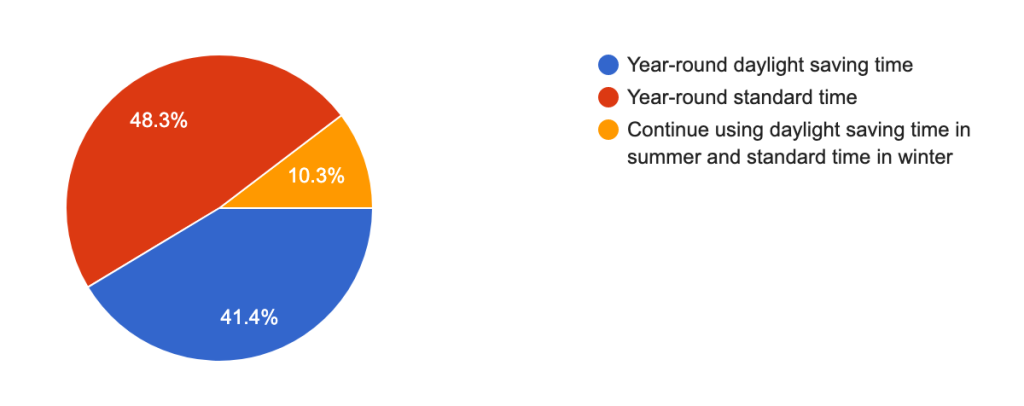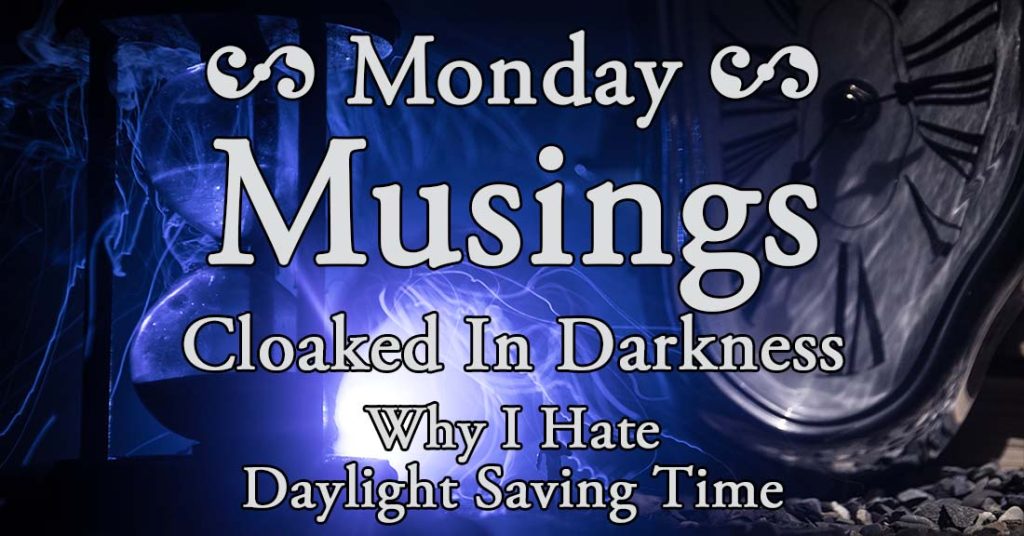Share This Musing
Musing: Cloaked in Darkness
Monday, January 8, 2024
Christmas and New Year’s Day on Saturdays create a weird set of weeks in the shortest days of the winter of 2023-2024, so January 8 is the first normal Monday in a long time. School kids head back to class. Workers commute to their jobs. And we’re out with the dogs for their morning walk.
The draft of my next novel sits on my desk waiting for revisions. I need to settle in my chair and put in a full day, but first I must attend to canine duties. My office co-workers will snooze only after exercising and eating breakfast.
The problem? It’s dark. Pitch-black dark. The neighbors have removed their Christmas decorations, so no more twinkling lights guide our path. Children stumble sleepily along the sidewalk, their bobbing flashlights marking their journey. Headlights pierce the shadows as cars inch along the streets, taking their occupants to offices and factories.
We have no choice but to move in the dark. Sunrise isn’t until 8:41 a.m. here in Asheville. Most of us are unhappy. We wonder who stole our sunshine. We curse. We scream.
Yes, we hate daylight saving time.
It’s Déjà Vu All Over Again
Now I know some of you are already angrily scribbling a comment saying I’m crazy. Everyone will love having an extra hour of daylight.
First, I will point out that the same amount of daylight will occur no matter how we set our clocks. We don’t control that.
Second, I know how we will feel because we’ve already done it. I wrote the intro as if it was 2024, but I could have easily told the tale from January 1975. I was one of those kids stumbling to school in the dark and settling into my desk before the sun rose.
In the height of the energy crisis, the United States passed a law shifting clocks to year-round daylight saving time for a two-year experiment. Confident proponents believed that the citizenry would say how great it was and clamor to make the change permanent.
The opposite happened. The change was so unpopular that the experiment stopped halfway through. We only suffered through one dark winter before going back to changing our clocks.
Many old-timers grumbled then that they could have told us it wouldn’t be popular. We had tried it during World War II as well. And World War I.
So why do we keep forgetting? Senator Marco Rubio, who sponsored the Sunshine Protection Act passed by the Senate last week, was born in 1971. He was 3 the last time we tried this. He doesn’t remember.
But No One Likes Changing Clocks Twice A Year
Stopping the twice-yearly time changing is popular. Wildly popular. Most polls show roughly three out of every four Americans want to stop the practice.
Those same polls also show that half of them want year-round daylight saving time and half want year-round standard time.
The challenge of picking between the two can be summed up quite simply.
During the summer, the extra time in the evening created by changing the clocks is enjoyable. The light after work allows people to enjoy outdoor activities. Despite the later hour, the sun rises early enough to please even insomniacs like me.
Winter, however, is much more difficult. The short days mean darkness in the mornings and evenings no matter what, especially the further north you live. Proponents of daylight saving time want at least some sunshine when they get home from work, a reasonable goal. Supporters of standard time want the same for getting started during the day. There is no solution that satisfies both.
What history tells us, though, is that daylight saving time in the winter has been wildly unpopular every time we have tried it. The cold, dark months are already difficult on our emotional state and starting our day in the dark makes it more challenging.
The Sunshine Protection Act
Fortunately, our U.S. Senate convened committee meetings, designed a well-thought-out bill, and had a lively debate on the floor. After this thorough vetting, every Senator voted to go to year-round daylight saving time. That’s what happened, right?
Nope.
The Sunshine Protection Act passed by a technical procedure known as unanimous consent. Any Senator can propose something to be approved without objection. If any single Senator objects, then the bill must follow regularly procedures and a floor vote. If no one objects, however, the bill passes automatically. So it’s more accurate to say no one voted against it rather than everyone voted for it.
The process is used primarily for general, mundane business that doesn’t have controversial impact. Approving National Celery Stalk Day via unanimous consent doesn’t really harm anyone, unless you really hate celery.
To ensure no one abuses the process, a long-standing gentleman’s agreement exists where all Senate offices are notified in advance of any upcoming issues. The staff reviews the proposals, alerts their Senator to issues that he or she might object to, and the Senator has ample opportunity to visit the floor at the right time to object.
So imagine the surprise of Senators who have had a long-standing opposition to year-round daylight saving time (e.g., Senator Tom Cotton) when they discovered they had approved such a bill. If they had known, they would have probably been in chambers and registered their objection, sending the bill to a formal vote. A law affecting the vast majority of Americans passed without citizens, media, and even many Senators knowing it was up for a vote.
But whether proper notifications were given doesn’t change the fact that the bill met the standards of unanimous consent. Undoing that process isn’t simple. Because it passed unanimously, it can only be repealed unanimously, a virtual impossibility since it only takes one Senator to object.
Thus, the bill goes to the House. What happens next is a wild guess. Either the bill comes up for vote and gets approved (because no one wants to vote against an idea that is popular on the surface). Or the bill disappears like so many others and is never brought to vote.
So What Is The Solution?
Regardless of whether this particular proposal ends up becoming law or not, the issue remains that changing our clocks twice a year is a big negative. What solution will satisfy the most people?
I don’t know.
While I don’t want to be stumbling around in the dark on winter mornings, nor do I object to long summer evenings. I like standard time in the winter and daylight saving time in the summer—I just don’t like the pain of changing twice a year to them.
What do you think?
Survey Says
Those of you with long memories will remember I asked my readers before about their opinion on the time change. Like other surveys, you prefer to stop changing the clocks twice a year, but are also about evenly split between daylight saving time and standard time. Here are those results from March 2021:

Surveys Are Confidential / Subscriptions Are Free
Speaking of surveys—I’ve created an interesting problem. My monthly surveys (click here for this month’s on mayonnaise) are designed to be fun, entertaining, and confidential. Since I don’t track who answers, I have no way of answering questions privately. Unfortunately, each month at least a few people ask questions in a way that leads me to think they are looking for a reply.
So to the person who asked if subscribing to my newsletters are free, the answer is yes. You can subscribe to the weekly musing, the monthly newsletter, or both. No charge.
Interesting Links: Daylight Saving Time
Curious which are the nineteen states who have passed legislation requesting permission to have year-round daylight saving time? Statista has a clear graphic.
Intrigued by my comments about how unanimous consent might have accidentally created a sense of unity on this topic in the Senate? Buzzfeed has a great explanation.
Forgot about—or are too young to remember—those objections from 1975? NPR to the rescue.
And, if you really want to stretch your mind to possibilities, there is actually a fourth proposal—ditch time zones. While it sounds bizarre, many people in technical and scientific fields already use the Greenwich Mean Time as the Coordinated Universal Time to eliminate confusion. This is one you want to read and think about before reacting.
And, yes, I have mused about this topic before.
Vocabulary Word Of The Week: Temporal
Temporal is an adjective meaning related to time. In its broadest sense, it means earthly versus spiritual or secular versus sacred. The word traces back through Middle French to the Latin temporālis meaning temporary or relating to time versus eternity. It reminds us that time is a human construct.
Gratuitous Dog Picture
Frankie Suave is a good reminder of the best way to spend an extra few minutes—giving ear rubs and scratches. A gentle nudge (or not-so-gentle swat) with the paw drives home the message.
4 Comments
Leave a Comment
Subscribe to the Random Musings
Want to be sure never to miss a Musing? Subscribers will be notified when I post a random observations on life or a short story. The email is absolutely FREE and you my unsubscribe at any time.
Current Reader Survey Question
Enjoyed the Story? Try a Short Story
Secrets, passions, and a reunion that changes everything
Benjamin Walsh sees his wife, Nicole, walking down a city street. With her busy schedule at work, he doesn't know how she found time to get away, but tries to catch up to say hello.
To his surprise, she greets an old friend of hers, Eduardo Rivera. Eduardo left town two decades earlier to pursue a theatrical career in New York. What is he doing back?
Benjamin is shocked when Eduardo and Nicole embrace. They disappear through a door together. With understanding of what is happening, Benjamin realizes he has only one choice.
Publication Date: February 6, 2024
Format: E-book (EPUB, MOBI, PDF)
Pages: 38
Price: Pay what you want (Minimum 99¢ to cover processing costs)





I dread changing the clocks; many times I have changed the time in the wrong direction! One year, husband got a very early call from work: wonder why they are calling so early (clock changed the wrong way). Another year out to breakfast and wondering why everyone was eating hamburgers for breakfast (clock changed the wrong way). So I now wait til the next day and change clocks according to media info. I would be ever so happy if time was changed to permanent time in any direction!
I too am NOT a fan of changing the clocks. Leave them be and let TIME alone.
Frankie boy-I couldn’t resist giving you ear scratches and rubs. Our boy gives me his paw too for his daily scratches BUT of course he doesn’t have to. I gladly help him out!!
I would gladly give up that extra hour of light in the summer, in order to keep the sunrise at 8 in the winter. Winter is hard enough, but waiting until 9am I think would be torture. And it isn’t just the light, it’s our whole biorhythm that gets messed up with the time change. While I might miss that extra light it would make up for it during the dark, gloomy winter.
I am a night owl so dark mornings are not bad to me. But I also do not like the longer days in the summer because it causes the house to stay warm longer and all the idiots are out making noise (and yes unfortunately I am surrounded by bad people in the country not any good ones).